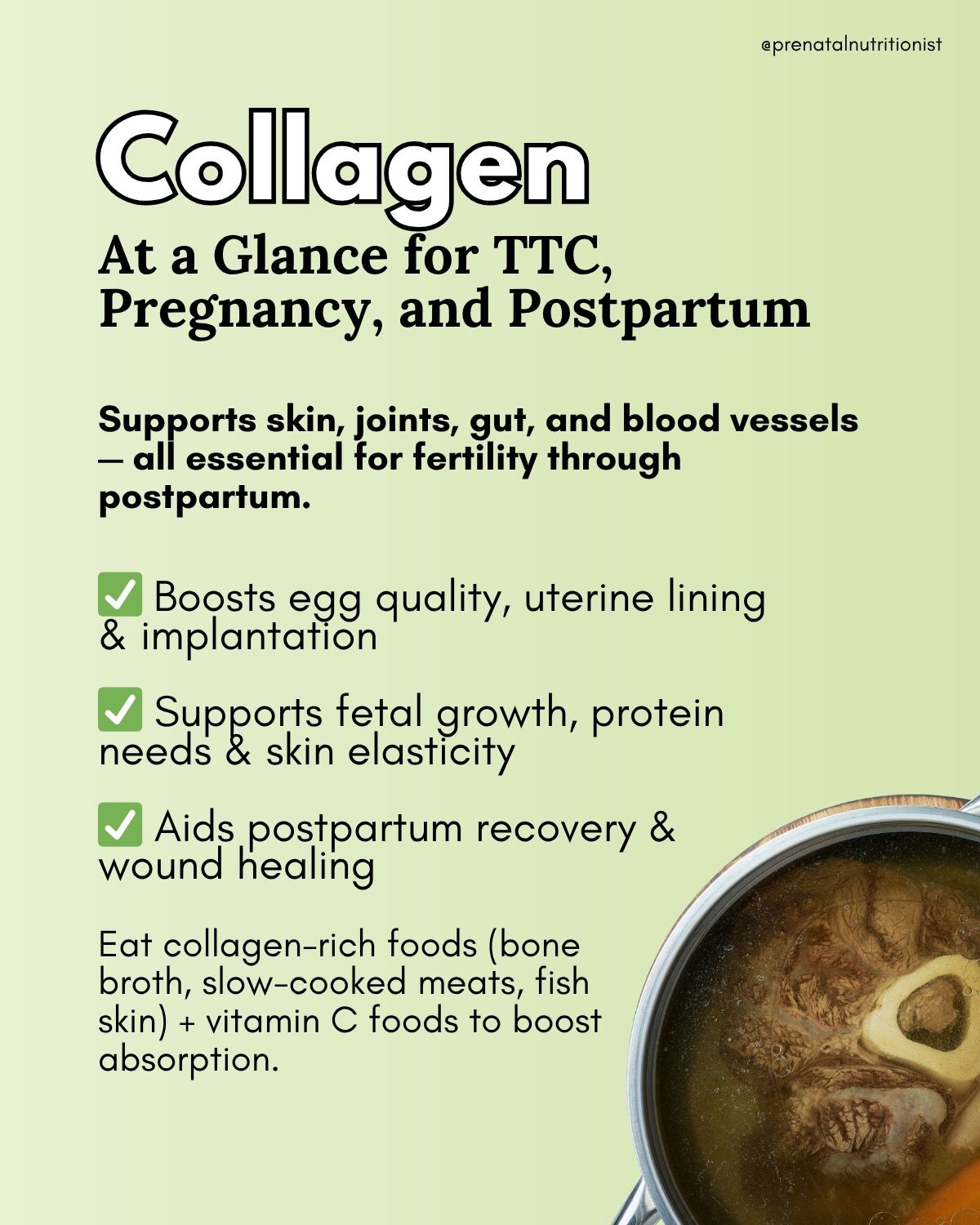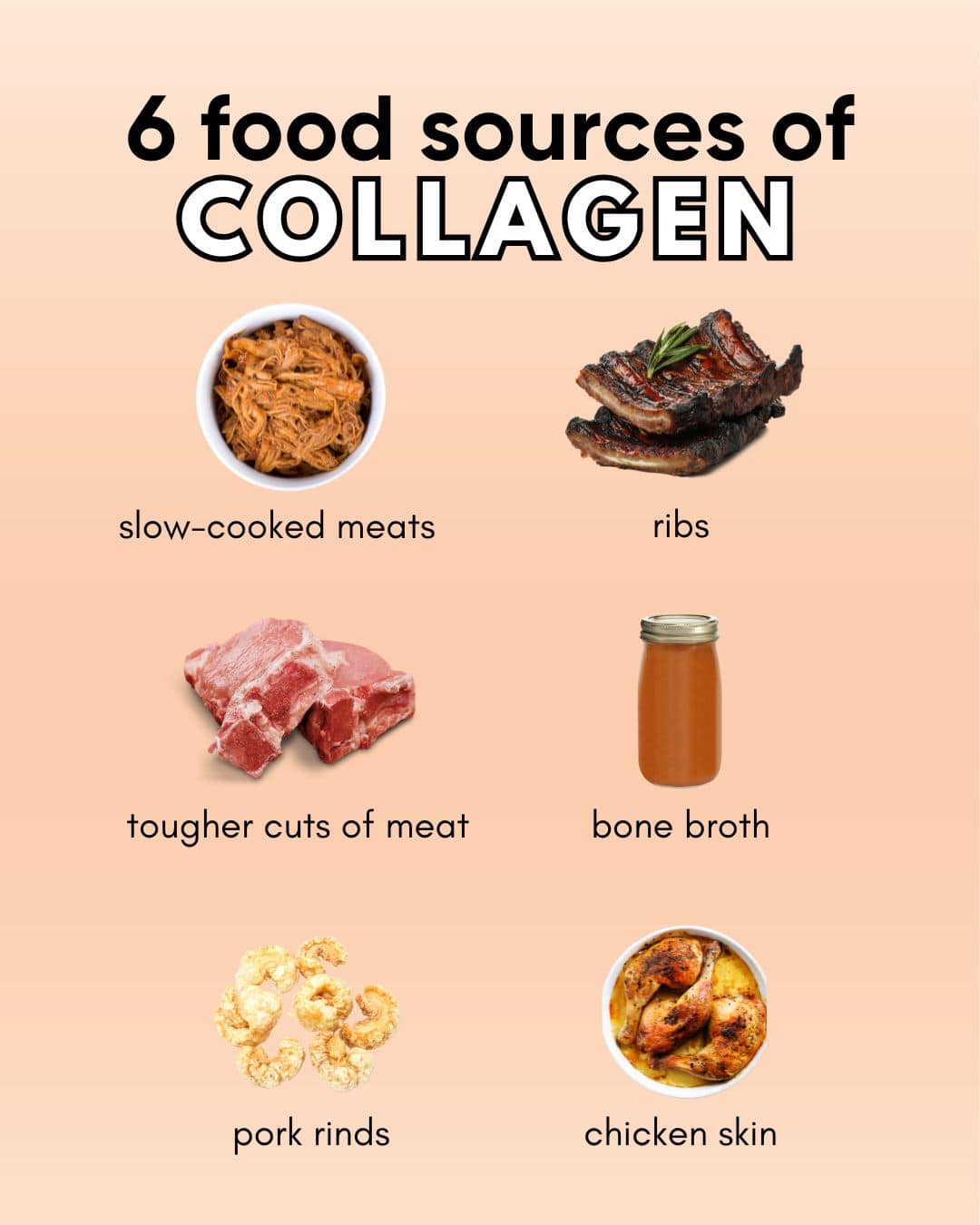What is collagen?
Collagen is the most abundant protein in the body, making up much of your skin, hair, nails, joints, and connective tissues. Glycine, the most abundant amino acid in collagen, works alongside proline to build and maintain these structures, with support from vitamin C and minerals like zinc and copper.
Collagen production naturally declines with age, and certain lifestyle factors can speed up that process. High sugar intake, poor nutrient status, and environmental stressors that cause oxidative damage all interfere with your body’s ability to produce collagen (1, 2).
Although collagen isn’t a complete protein—it lacks the essential amino acid tryptophan—it’s still important to include before, during, and after pregnancy.
What does collagen do in the body?
Did you know that there are actually five different types of collagen?! Each type is put to work in a specific part of your body (3):
- Type I makes up most of the collagen in your body (90%) and acts as a support structure for skin, bones, tendons, and ligaments.
- Gives support to joints and is found in elastic cartilage
- In your organs, muscles, and arteries
- In layers of skin
- In your eyes, skin layers, hair, and placental tissue
Let’s look more in-depth at the roles collagen plays in the body:
- Skin, hair, and nails: Collagen can support skin elasticity and hydration, provide structural support for skin, and protect it from free radicals (4, 5). It may also help nails grow and keep them strong, preventing brittleness and breaks (6).
- Joints, ligaments, and connective tissue: Collagen helps build a strong yet flexible structural framework for cartilage, ligaments, and tendons for strong and well-functioning joints (7).
- Gut lining and digestion: Collagen is critical for supporting your gut lining. It serves as a food source (prebiotic) for good bacteria in your gut (8) and supports its structural integrity.
- Blood vessels and circulation: Collagen helps blood flow smoothly to and from the heart and to wounds, improving wound healing (10).

How does collagen support fertility?
Collagen’s impact on egg quality and uterine lining
Collagen provides the structural protein essential for the integrity of the endometrium and reproductive organs, and supports hormone production and ovarian function (11). Maintaining healthy collagen levels can improve uterine lining thickness for implantation and promote the growth and function of ovarian follicles (11).
Adequate collagen in the body is also necessary for uterine tissue integrity to maintain a healthy pregnancy (11).
Supporting cervical mucus and implantation
Collagen helps the uterus be more receptive to implantation and helps the embryo attach (12).
Gut health and blood sugar balance
Collagen supports the integrity of the gut lining, promotes overall digestive health, and regulates blood sugar—two important foundations for fertility (13, 14).
In one small study, supplementing with 20 grams of collagen daily reduced bloating and improved mild digestive symptoms (9). While collagen alone won’t fix poor gut health, getting enough total protein, collagen included, is essential for maintaining a healthy digestive system.
To optimize collagen production, focus on nutrients that help your body make and absorb it effectively. Vitamin C, zinc, and copper are important, so regularly include foods like citrus fruits, seafood (particularly oysters), and red meat.
And finally, eating a variety of animal proteins throughout the day naturally provides collagen and the amino acids your body needs to keep producing it.

How does collagen support pregnancy?
Fetal development
Collagen supports fetal development by providing essential amino acids that help form organs, the skeletal system of bones and teeth, connective tissues, skin, and blood vessels.
Help you meet increased protein needs.
As mentioned, collagen isn’t a complete protein, but it still contributes meaningfully to your overall protein intake, like beans do; they are missing the amino acid methionine. Including collagen-rich animal foods regularly helps you reach your protein target at each meal—around 30 grams for most pregnant individuals.
Because it’s a highly bioavailable, high-quality protein source, collagen supports blood sugar balance, promotes healthy fetal growth, and helps you stay satisfied between meals.
Learn more about your protein needs here.

Promote your skin’s elasticity.
Your skin must stretch and grow a lot to accommodate your growing little one! Collagen can help maintain your skin’s ability to stretch and grow during this time (5).
Joint, ligament, and pelvic support
During pregnancy, the hormone relaxin significantly increases to soften and widen the cervix, expand pelvic bones, and relax ligaments to prepare your body for childbirth (25). However, this can contribute to increased joint instability and pain.
Studies have found that collagen helps improve joint function and reduce joint pain. Collagen supplementation, in particular, is a well-studied means of supporting joint health by providing structural support, cartilage, and reducing inflammation (15, 16).
Gut health, digestion, and circulation
Since collagen is essential to gut health, it’s important for gut health during pregnancy, when your gut health impacts not just you, but your developing little one (8).
Supporting your gut health is essential during pregnancy because you’ll pass your gut microbiome balance to your baby. So getting enough collagen is one (of many) ways you can improve your gut microbiome and your baby’s pregnancy.


How does collagen support the postpartum period?
Protein needs are even higher postpartum than during the third trimester of pregnancy. Whether you gave birth vaginally or via cesarean section, your body is hard at work on repairing torn tissues, restoring skin integrity and muscle recovery, and drawing from nutrient stores if you breastfeed.
Wound healing (C-section or vaginal tears)
Collagen is part of the extracellular matrix (a network of proteins that surrounds tissues and cells around organs) and is involved in each stage of wound healing. Unsurprisingly, collagen is known to enhance wound healing as it rebuilds skin, aids in the repair process, and significantly accelerates overall wound healing (17, 18, 19, 20).
Pelvic floor + connective tissue recovery
Collagen is essential for restoring strength to pelvic floor muscles after they are stretched and weakened throughout pregnancy and during vaginal birth. Luckily, collagen can strengthen the pelvic floor again (21).
Breastfeeding considerations
Not only can it aid in your recovery and contribute to your increased protein needs, but it can also support the growth and development of your infant, synthesize milk proteins, and maximize milk production (22).

What are the best food sources of collagen?
Lots of meats and seafood-related products are great sources of collagen.
In particular, foods highest in collagen include:
- Bone broth
- Fish skin and bones (like canned salmon)
- Chicken skin
- Slow-cooked meats
- Pork rinds
- Ribs
- Tougher cuts of meat with bone-in and skin-on, and cook in soups and stews (these are usually more budget-friendly as well)

As mentioned above, vitamin C assists with the use and synthesis of collagen in the body. Pairing collagen—and glycine-rich foods with vitamin C-rich foods can help with collagen synthesis and its role in the body (23).

Is consuming collagen from supplements as ideal as consuming it from food?
Like most nutrients, it’s best to get collagen from whole food sources whenever possible.
Collagen-rich foods, bone broth, and slow-cooked meats also provide other key nutrients for pregnancy, especially protein, zinc, and iron. Prioritizing these foods helps you meet your increased nutrient needs during pregnancy and postpartum in a more complete, bioavailable way.
That said, if you’re struggling with nausea, low appetite, or simply need extra support to meet your protein goals, a high-quality collagen supplement can be a helpful addition. Powders or capsules can be an easy “insurance policy” to ensure you’re getting enough to support you and your baby.
Is it safe to consume collagen supplements during pregnancy and breastfeeding?
Generally, high-quality collagen supplements can be consumed safely during pregnancy and breastfeeding (26). Note that the key is high-quality since these are not well-regulated and thus cannot be guaranteed safe, especially during pregnancy.
Look for reputable brands that contain hydrolyzed collagen or peptides that make the collagen easier for your body to digest and absorb.
What are the best collagen supplements?
Collagen supplements come in many forms: powders, capsules, liquids, and multi-collagen (sourced from two or more animals). Collagen supplements may be sourced from bovine, marine, or other sources, such as pork, but there is no clear superior contender regarding benefits (24).
Choose the form of collagen supplement you prefer, which is easiest for you to take.
Ideally, the supplement you choose will be tested by a third party. It’s also a good idea to buy supplements that specify the absence of heavy metals. It should be apparent on their website and typically the product itself that it has been third-party tested.

Take collagen in the recommended serving amounts. Depending on your needs, collagen is often a supplement that can be consumed 1-3 times daily.
Some quality options include:
- Further Food (Discount: RYANN18)
- Needed (Discount: TPNL)
- Paleo Pro
- Perfect Supplements
- Ancient Nutrition
The Bottom Line
- Collagen plays a powerful, multi-stage role in your reproductive health—from preconception through postpartum recovery.
- Five main types of collagen support your skin, hair, nails, joints, connective tissues, blood vessels, and gut. Together, they help maintain the structure and strength your body needs during pregnancy and beyond.
- For fertility, collagen supports egg quality, uterine lining health, cervical mucus production, and implantation, promoting gut health and blood sugar balance. During pregnancy, it contributes to fetal development, supports your growing protein needs, promotes skin elasticity, and helps protect your joints and ligaments.
- You can boost your collagen intake by eating foods naturally rich in it—like bone broth, fish or chicken skin, pork rinds, and slow-cooked meats—and pairing them with vitamin C–rich foods such as citrus and broccoli to enhance absorption.
- Whenever possible, prioritize food sources of collagen since they come packed with additional nutrients that support pregnancy and postpartum recovery. But if nausea, appetite changes, or higher needs make it tough to meet your goals through food alone, a high-quality collagen supplement can be a helpful addition to ensure you’re getting enough.
